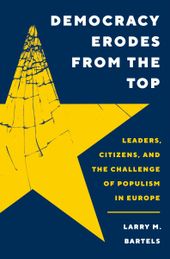
Democracy Erodes from the Top: Leaders, Citizens, and the Challenge of Populism in Europe
A seeming explosion of support for right-wing populist parties has triggered widespread fears that liberal democracy is facing its worst crisis since the 1930s. In his book Democracy Erodes from the Top, Larry Bartels reveals that the real crisis stems not from an increasingly populist public but from political leaders who exploit or mismanage the chronic vulnerabilities of democracy. Bartels will engage in a conversation with Nik de Boer and Sarah de Lange. Moderator: Ursula Daxecker.
In this provocative book, Bartels dismantles the pervasive myth of a populist wave in contemporary European public opinion. While there has always been a substantial reservoir of populist sentiment, Europeans are no less trusting of their politicians and parliaments than they were two decades ago, no less enthusiastic about European integration, and no less satisfied with the workings of democracy. Electoral support for right-wing populist parties has increased only modestly, reflecting the idiosyncratic successes of populist entrepreneurs, the failures of mainstream parties, and media hype. Europe’s most sobering examples of democratic backsliding—in Hungary and Poland—occurred not because voters wanted authoritarianism but because conventional conservative parties, once elected, seized opportunities to entrench themselves in power.
By demonstrating the inadequacy of conventional bottom-up interpretations of Europe’s political crisis, Bartels turns our understanding of democratic politics upside down. At SPUI25, Bartels will present his book and consider the implications of his research in a discussion with Nik de Boer and Sarah de Lange that is moderated by Ursula Daxecker.
About the speakers
Larry M. Bartels holds the May Werthan Shayne Chair of Public Policy and Social Science at Vanderbilt University. His scholarship and teaching focus on public opinion, electoral politics, public policy, and political representation. His books include Democracy for Realists: Why Elections Do Not Produce Responsive Government (with Christopher Achen) and Unequal Democracy: The Political Economy of the New Gilded Age (2nd edition), both published in 2016. He is also the author of numerous scholarly articles, and of commentaries in the New York Times, Washington Post, and other prominent outlets.
Nik de Boer is Associate Professor in Constitutional Law at the Amsterdam Law School. His research focuses on democratic backsliding and democratic questions about the legal architecture of the financial system. Earlier research primarily concerned the role of constitutional courts in the EU. His first book, Judging European Democracy, was recently published by Oxford University Press and offers a systematic analysis of how we should assess the democratic legitimacy of the national constitutional courts’ review of European law.
Ursula Daxecker is Associate Professor in the Department of Political Science at the University of Amsterdam where she is a member of the research group Political Economy and Transnational Governance. Her research interests focus on political violence, organized crime, and electoral processes in the Global South. From 2020-2025, she is the principal investigator of the project “Elections, Violence, and Parties,” funded by the European Research Council.
Sarah L. de Lange is Professor of Political Pluralism at the Department of Political Science at the University of Amsterdam. From 2016 to 2022 she held the Dr. J.M. Den Uyl chair, a chair established by by the Wiardi Beckman Foundation. Her main research interests concern parties, party families, and party systems. Her work is broad in geographical scope and examines party politics in a range of East and West European countries.

:rgb(-15)

:rgb(-25)

:rgb(8)
